"Happy Lazzaro" is the third work directed by Italian emerging female director Aliche Rohrwacher. She won the Best Screenplay Award at this year's Cannes Film Festival with this film.
However, this is not the first time for her to shine at the most influential and top international film festival in the world. As early as 2014, she won the second Cannes Award Jury with her second work "Miracle" The heavyweight award of the Grand Prix can be called the rising rookie overlord in the film industry.
Aliche is good at deconstructing ordinary life with surreal and mysterious elements, so as to gradually reveal the core theme of the film, and "Happy Lazzaro" is no exception.
marginalized lazzaro
The story of "Happy Lazaro" begins with a scene of Lazaro standing alone in front of a warehouse with a musical instrument.
This picture implies the crowd's alienation to Lazaro and Lazaro's alienation from the crowd, and this can also be seen from the peasants who wantonly "command" Lazaro at the back. They did not treat Lazaro as a human being. Just treat him like a tireless machine helping them toil.
When Lazaro had a fever and needed a rest, no one would let him rest in his room except his "grandmother" who suffered from Alzheimer's.
He is a severely marginalized figure in Invoice.
Lazaro and Tancredi
In Invoice, there are also ruling classes like the Marquise, Tancredi.
The peasants, aware of their class gap with the marquise's son Tancredi, felt jealous and hated, and could only boo behind their backs.
But Lazaro is different. The peasant in his eyes is no different from the marquis, so he is the only one who dares to look directly and chat with Tancredi.
The arrival of Tancredi prompted Lazaro to calm his heart and set off waves.
For Tancredi, Lazaro is a special existence in Invoice, only he is willing to unconditionally believe in himself and follow himself.
Tancredi, like Don Quixote, lost his sense of reality and sank into endless fantasies, disguised as a pseudo-knight full of inner romance, delusional to use a small slingshot against the nobles of the world, and Lazaro became His Sancho Panza.
The ordinary windmill in the eyes of Sancho Panza was regarded by Don Quixote as the imaginary enemy of the giant.
The ordinary earth ditch in Lazaro's eyes was said to be the moon by Tancredi.
Tancredi indulged in his self-righteous fantasies. After many years of being a poor and destitute aristocrat, he still refused to admit this fact. His family broke the contract with rage, and the decades he had lived had become a nihilistic sorrow. In the end, in order to live, he had to use his wife's mouth to embarrassedly go to Antonia to spend all his family's property - 50 euros for a banquet gift.
The story of the old wolf
There is a very eye-catching narration in "Happy Lazaro", which tells the story of an old wolf for us in two paragraphs. This story is the central theme of the whole film. After reading it, you can understand "Happy Lazaro". Lazzaro.
The first paragraph of the story goes something like this:
"An old wolf was driven out of the wolf pack because of his old age. He was very hungry, so he ran to the house of humans and ate those chickens and ducks. Humans tried to kill him, but he didn't have the courage, so he was on duty day and night and set up a Many traps, humans hate this wolf, think he is fierce and strong, but what they don't know is that this is just an old and weak wolf."
This fable is confirmed, the marquise's enslavement to the peasants.
The peasants were exploited by the marquise and dared not speak out. They secretly called them "Lady Viper", but they believed that everything the marquise did to them was justifiable. However, the truth was that the tenancy system had been abandoned. For a long time, the Marchioness was nothing but a deceiver.
Some of them had the opportunity to rise up and go to the city by car to make a living, but in the end they were trapped by the words of the Marchioness, their footsteps were imprisoned by narrow thinking, and they could only live in the lies they weave for themselves all day long .
Second paragraph of the story:
"Later, the story of the old wolf came to the ears of a sage, he had the ability to communicate with animals, people respected him and obeyed him, so people went to the sage, and the sage accepted the people's request - the one who negotiated peace with the wolf. demanded, so he set off to look for the wolf, the sage traveled a long way, he walked and walked, and winter came, the sage was exhausted, he was cold and hungry, but still could not find a trace of the wolf, he did not What I know is that the wolf is also hungry, and he has been following the saint for a long time, finally one day, the saint fell, he fell on the snow, the wolf finally appeared, the wolf slowly, grinning and approaching him , Just when the wolf was about to eat him, the wolf suddenly smelled a smell, this smell he had never smelled stopped him, he sniffed again, what is this smell?"
"The smell of a good man."
There is no doubt that Lazaro is the good man in the film, that is, the saint in the second story, but unlike the fable, after the saint came out of the story, people did not respect him or obey him. He treated him as a tool, his wise ignorance as cowardly and blind obedience, only Antonia, who had a good impression of him, would treat him as a normal person, and when Lazaro returned after many years, he bowed his head and bowed to the miracle.
The wolf in the second paragraph has a completely different meaning from the first paragraph.
What he represents is an omniscient and almighty existence similar to God, who gave Lazaro a second life after falling off a cliff, for him, a good man, to realize his wish to meet Tancredi again.
And the final ending of the saint coming to the world again, the end of the film also revealed it self-evidently in a surreal way:
"Later, the saint became a 'bad guy' and the old wolf (God) came back and took his life."
Lazaro has all the qualities of a saint, he hardly feels any negative emotions, he is willing to do every job, and every thing can make him feel the existence of happiness.
But in this turbid world, he who is so clear as water is like an alien.
People will treat him well when they need help and kill him when necessary.
Lazaro didn't understand, and couldn't know, why they did this.
Therefore, in this turbid world, death is his only end.
View more about Happy as Lazzaro reviews









